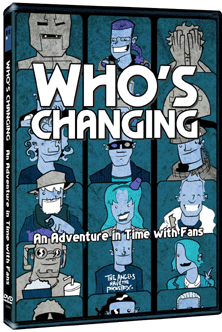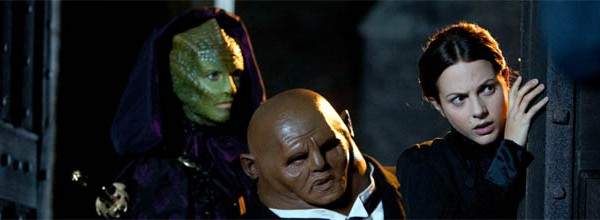With input from on-screen stars such as Louise Jameson (Leela) and Sophie Aldred (Ace) as well as a host of contributors from both the television show and external media, the film starts with the beginnings of Doctor Who fandom.
Developing from a college society into a national fan club, long-term fans Jeremy Bentham and Jan Vincent-Rudzki discuss the origins of the Doctor Who Appreciation Society and the first convention, which took place in a Battersea church hall in August 1977.
From tales of these early gatherings we learn of a predominately male fanbase, occasionally accompanied by their long-suffering mothers. Its modern transformation into a more balanced gender split is attributed to two reasons. Firstly, as Torchwood writer Jane Espenson reflects, there has been a general shift within genre fandom as shows have grown to embrace stronger emotional character arcs. Secondly, various interviewees assert that the casting of younger, more attractive Doctors has helped to bring the show into the mainstream.
 With some fans commenting strongly on their dislike of the show’s ‘sexing up’, it is clear that there is a broad church of opinion. Writer and Script Editor Gary Russell’s opinions on the subject are worth considering here, as he makes the distinction between the casting of ‘sexy’ people as opposed to making the show overtly sexual, which it rarely us. Regardless, Jane Espenson suggests that a good looking chap like David Tennant offers a gateway to fan fiction and the realms of unbridled imagination.
With some fans commenting strongly on their dislike of the show’s ‘sexing up’, it is clear that there is a broad church of opinion. Writer and Script Editor Gary Russell’s opinions on the subject are worth considering here, as he makes the distinction between the casting of ‘sexy’ people as opposed to making the show overtly sexual, which it rarely us. Regardless, Jane Espenson suggests that a good looking chap like David Tennant offers a gateway to fan fiction and the realms of unbridled imagination.
Looking at the gap between ‘Survival’ and the series’ resurrection in 2005, it is suggested that fandom became both more sociable and more creative, with Virgin’s New Adventures novels, Doctor Who Magazine and Big Finish audio dramas keeping the show alive.
With many of those flame-keepers becoming involved in the production of the new series, it is heartening to hear tales of a new generation of fans; comic writer Richard Dinnick speaks warmly about his daughter’s passion for the show, as does writer Andrew Smith, and it is clear that Doctor Who has recovered its place as a show that is shared by all the family.
The latter part of the film looks at the creativity of fans, with a focus on people who like to dress as their favourite characters.
Cosplay attracts a wide range of participants at modern conventions and we also meet gender-swapping Crossplayers too, including a group of men dressed as female versions of the Doctor which leads into an interesting discussion of the sexual politics of dressing up.
With its broad cast of colourful fan interviewees, in addition to an impressive roster of people involved with the show, Who’s Changing paints an affectionate portrait that is refreshingly far removed from the regular anorak stereotypes. It is clear that at fifty, Doctor Who maintains a healthy, vibrant following of people of all ranges, shapes and persuasions and this documentary will hopefully go some way to redressing the balance.
Extras: Five full-length interviews are provided, from which excerpts were taken for the main feature. With a combined running time of around 80 minutes, Louise Jameson, Sophie Aldred, Simon Fisher-Becker (Dorium Maldovar), Neve McIntosh (Madame Vastra) and Dan Starkey (Strax) all speak warmly about the positive associations Doctor Who and its fans have had on them.
![]()
Released on DVD on Monday 27 January by Capital City Entertainment.
Watch the trailer for Who’s Changing…
What did you think of the documentary? Let us know below…

